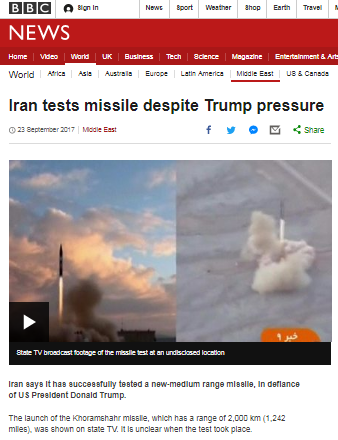September 23rd saw the appearance of a report titled “Iran tests missile despite Trump pressure” on the BBC News website’s Middle East page.
In addition to an account of the display of a new ballistic missile at a military parade in Tehran, the BBC’s report purports to provide readers with background information on several aspects of the story.
“US President Donald Trump criticised the launch, saying the missile was capable of hitting its ally Israel. […]
In a tweet on Saturday, Mr Trump criticised Iran and accused it, without elaborating, of co-operating with the North Korean regime.”
Two days prior to the publication of this BBC article, the French president had expressed concerns about Iran’s missile programme but that fact was not conveyed to readers.
‘He [Macron] told reporters that Iran’s ballistic missile program must be curtailed and cited the need to reassure “states in the region, and the United States.”‘
Following the display of the missile on Friday, France put out statement that was also not mentioned in this BBC report.
‘An “extremely concerned” French foreign ministry warned the launch violated the United Nations Security Council resolution that endorsed the accord.
“France demands that Iran halt all destablizing activities in the region and to respect all provisions of Resolution 2231, including the call to halt this type of ballistic activity,” a statement read.
“France will consider ways, with its European and other partners, to get Iran to stop its destabilizing ballistic activities.”’
The BBC, however, appears to be keen to steer audiences to the conclusion that opposition to the Iranian ballistic missiles programme comes exclusively from the US and its president.
The report goes on:
“The US announced fresh sanctions on Iran in July over its ballistic missile programme and what it said was Iran’s support for terror organisations.” [emphasis added]
Apparently the BBC is not convinced that Iran’s support for Hizballah, Hamas, and Palestinian Islamic Jihad cited in the US statement at the time constitutes “support for terror organisations”.
In an insert of analysis titled “A message to Trump” from BBC Persian’s Kasra Naji readers find the following statement, which does not clarify that the resolution concerned relates to the JCPOA:
“The missile test is arguably a borderline case as far as the UN Security Council is concerned. A resolution calls on Iran not to undertake any activity related to ballistic missiles designed to be capable of delivering nuclear weapons.”
However, later on in the same report readers are also told that:
“It [the US] says such launches violate the spirit of the 2015 agreement between Iran and six world powers to limit its nuclear programme in exchange for sanctions relief. […]
Tehran insists its missile programme does not contravene the agreement. It says the missiles are not meant to carry nuclear warheads.”
The relevant part of UN SC resolution 2231 – paragraph 3 of Annex B (p.99) – does not relate to what Iranian ballistic missiles are “meant to carry” but rather to what they are capable of delivering.
“Iran is called upon not to undertake any activity related to ballistic missiles designed to be capable of delivering nuclear weapons, including launches using such ballistic missile technology, until the date eight years after the JCPOA Adoption Day or until the date on which the IAEA submits a report confirming the Broader Conclusion, whichever is earlier.” [emphasis added]
This is not the first time that the BBC has amplified Iranian messaging on the topic of its ballistic missiles programme without adequate clarification of the issue to audiences.
Related Articles:
BBC News promotes Iranian missile ‘deterrent’ propaganda
BBC WS ‘Newshour’ misleads on EU statement on Iran missile test




